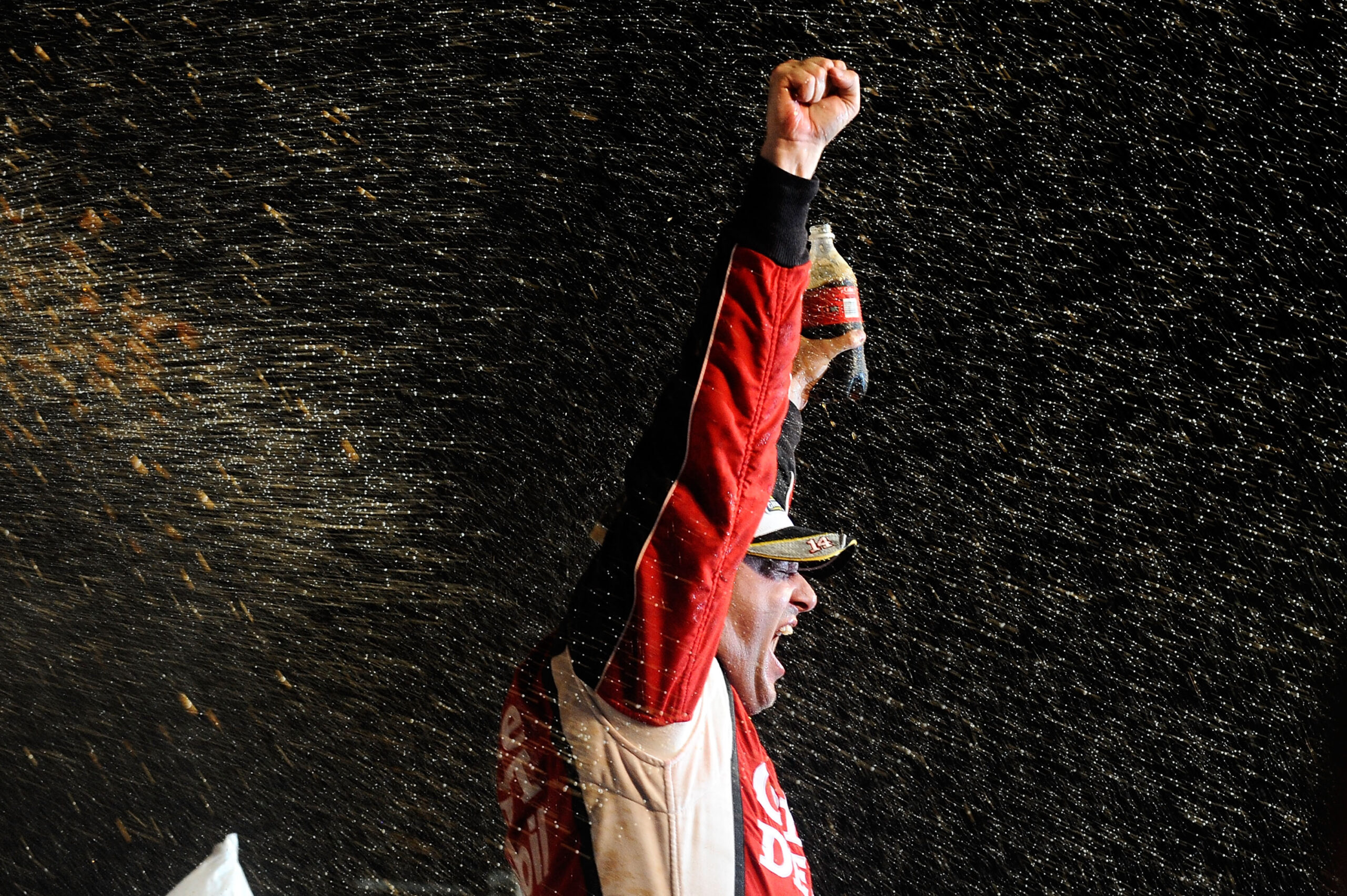

In any sport, it’s the memorial moments that keep fans around and plugged in. It’s the storylines which create our heroes and those heroes grow and generate a sort of cosmic reputation; they become legends which transcend time. NASCAR is no different.
When we look back at our favorite drivers, yeah, we can think of a handful of wins in their back pockets that make their career highlights. For Dale Earnhardt Jr., his 2012 victory at Michigan, or the one four years before it, are almost equally as significant for his fans. But what we’re going to look at today is not the best or most dominant wins of a particular driver’s career. Some of these wins might also fall into that category but what we’re most interested in here is the significance of that win as a whole to the sport of NASCAR.
In no particular order, here are the 8 most important victories in the 75 year history of our sport. Check it out.
Why don’t we kick things off with the undisputed King of our sport, Richard Petty. Countless debates can be had which 7-time champion was the greatest wheelman but the reality is that it is insignificant in the grand scheme of things. The Petty name is power house amongst NASCAR fans and King Richard is a large part of the reason why.
The 7-time Cup Series Champion and 7-time Daytona 500 winner would set a series record on July 4th of 1984, a record that will never be broken: the King took his 200th trip to victory lane. This win isn’t just significant in the context of Petty’s career. He was the King then, he is the King now, and he will always be the King. But this win in particular stands out not only because it scored him a jaw dropping statistic, it was important because it was another large step towards finding a national audience.
The President of the United States, Ronald Reagan gave the command to fire engines from Air Force One. As the race commenced, the aircraft could be seen landing just behind the track. Subsequently, the President was escorted to Daytona International Raceway where he would watch the conclusion of the race and even interview the now 200-time winner post-race. All eyes were on NASCAR that day as the King scored his 200th checkered flag.
In 1992 at Atlanta, King Richard would turn his final laps in his famous Petty Blue STP No. 43. Meanwhile, in the very same race, Wonder Boy, Jeff Gordon, would turn his first laps. Gordon, driving his famous rainbow warriors paint scheme, would go full-time in 1993, but would go winless. He’d score his first ever Cup Series victory in the Coca-Cola 600 in 1994, the same year Dale Earnhardt would score his seventh and final Winston Cup Championship. But that’s not the win we’re looking at today. No, we’re looking at later on in the year when the NASCAR Cup Series rolled into the iconic Indianapolis Motor Speedway for the first time.
Indianapolis was then, and perhaps always will be, looked at as the greatest special in racing. Jeff Gordon’s career path before jumping ship over to stock cars was headed towards CART…or towards the Indy 500. This was the first time Jeff Gordon or any stock cars turned laps on the famous Brickyard.
Jeff Gordon’s victory indicated a passing of the torch. Though Dale Earnhardt would go on to win the Brickyard 400 the following year, claiming that he was the first man to win the race, Jeff Gordon got there first, and would go on to become one of the greatest drivers NASCAR had ever seen.
In the moment, maybe this win would not have been seen as significant in the grander scheme of the sport. To Earnhardt fans, it was almost certainly a thrill. He had been struggling the last several years. Even despite his Daytona 500 victory in 1998, the season, overall, isn’t considered one of his better ones. And 1999 was much of the same.
But by 2000, The Man in Black was back and with vengeance. With only a handful of laps to go, he raced from deep in the pack only to capitalize on a mistake made by his son as he rocketed to lead. No, in the moment, maybe this was viewed as just Earnhardt doing an Earnhardt thing. He was Mr. Restrictor Plate, after all. But, in hindsight, it would be the final victory of a legendary career.
Earnhardt would pass away the following February as he was involved in a last-lap crash in the 2001 Daytona 500. He is still dearly missed.
It was a set of circumstances that none of us could even begin to imagine. NASCAR had lost one of the biggest heroes of its sport. But what was there to do but move on? Car owner Richard Childress considered calling it quits. But then he recalled something his fallen friend had once said to him: If it ever happens to me, you better go race.
So, RCR went into Rockingham with a white No. 29 GM Goodwrench machine. The driver was full-time Busch Series competitor, Kevin Harvick. It would only be a few weeks later at Atlanta when Kevin Harvick and that old No. 3 turned No. 29 team would give their eulogy.
There wasn’t a dry eye in the stands as Kevin Harvick beat and banged across the finish line with none other than Jeff Gordon, similar to the trading paint Dale did with Bobby Labonte at the very same track the year before. Kevin Harvick would win his first race with a renumbered 3 team and kickstart that healing process.
Later that same year, a son carried a message to his father using lessons learned. It was the first time NASCAR had returned to the track that stole Dale Earnhardt’s life. It would be only fitting, then, that Dale Earnhardt Jr. would drive his number 8 Budweiser Chevy to the front with only a handful of laps remaining to score the victory.
In the postrace, you can see complete breakdown. DEI guys including Daytona 500 champion, Michael Waltrip are celebrating. As are the crewmembers of Harvick’s revamped Dale Earnhardt team, including longtime crew member Chocolate Myers. As Tony Eury Sr. says in his post race interview, DEI is tough.
Ever wonder where our winner-take-all championship format comes from? Well, it’s this race, of course!
Tony Stewart was, at the time, a two-time champion in the Cup Series. When he left Joe Gibbs Racing and announced a new driver-owner partnership with the then struggling Haas CNC Racing, everyone thought he was out of his mind. However, he quickly put any doubts to bed on whether or not he was going to be competitive as he had a really good 2009 season.
2011 was a different story, though. For every good run Stewart and his No. 14 Office Depot/Old Spice Chevy had for his own SHR, something would go wrong, whether it be a mechanical failure, a mistake on pit road, or just a general lack of speed.
He was quoted saying that he didn’t even deserve to be in that year’s Chase for the Cup. Then, he went out and won 5 of the 10 post-season races, including this one. In a hard-knuckled battle with Carl Edwards, Tony Stewart would tie him in points but, with his now 5 wins, would own the tiebreaker and become NASCAR Cup Series Champion for the third and final time.
This race would lay out the blueprints for the winner-take all system we have today. And bonus points: it was the first time an owner-driver had won a NASCAR Cup title since Allan Kulwicki in 1992.
Jimmie Johnson, good ole 7-time, was a beneficiary of the now several year old winner-take-all championship format when he won his seventh and final title. Johnson wasn’t nearly at his dominant peak anymore but was still competitive enough to be there in the end when it counted. He would make that year’s championship 4 and launch from second place to the lead during a late-race restart. He’d hold off up-and-comer Kyle Larson to not only win the race but also his seventh championship, tying the great Richard Petty and the late Dale Earnhardt. It would be the last truly competitive season of Johnson’s career.
For a while there in the late 2010s and early 2020s, it seemed like there was a high profile driver retiring every year. In ’15 it was Jeff Gordon. ’16 saw Tony Stewart hang it up. And in ’17, Dale Earnhardt Jr. turned his final laps in the NASCAR Cup Series. 2018 saw a new dawn for Hendrick Motorsports and…it was a struggle to say the least. Chase Elliott was just trying to get his first win, Jimmie Johnson was in the twilight of his career, and William Byron and Alex Bowman were doing all they could do to score some top-10s.
Then, in 2020, Jimmie Johnson announced his retirement. He would turn his final laps at that season’s finale in Phoenix. Chase Elliott would emerge as HMS’ top dog as he made it to the final four. And while 2020 was by no means a dominant season for Elliott, it did seem to mark the passing of the torch from one generation to another as Chase Elliott scored his first Cup Series title by winning the race. In the aftermath, Jimmie would literally pass the torch as he said his farewells to NASCAR…for the time being, anyway.
What do you think of our list, Daily Downforce readers? Shout it out and let us know! And keep it right here for all your breaking news in the world of Motorsports!
